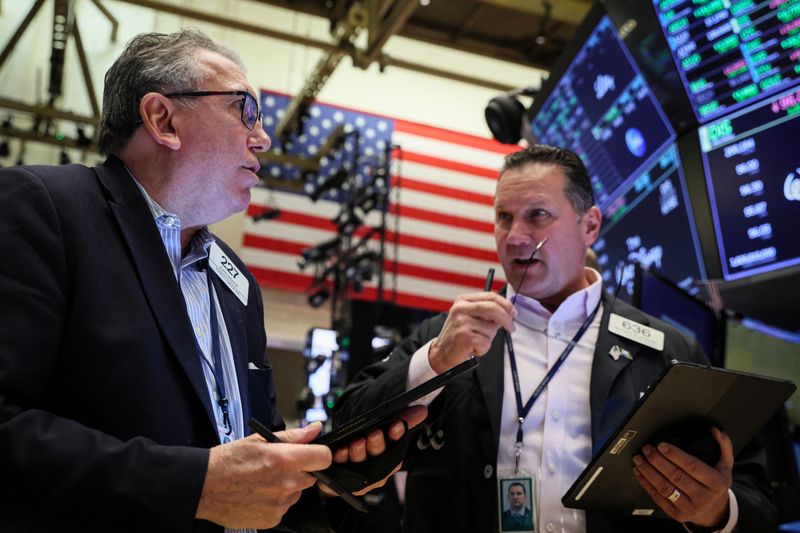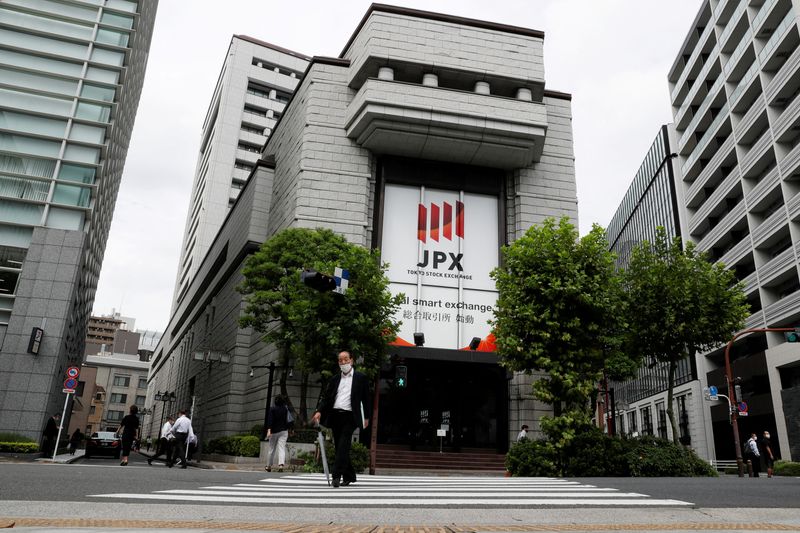By Herbert Lash and Amanda Cooper
NEW YORK/LONDON (Reuters) -Global stock exchanges surged on Wednesday as markets took heart from greater stability in the banking sector, but most Treasury yields edged higher as uncertainty lingered and bond investors gauged the impact of rising interest rates on economic growth.
The sale of assets in Silicon Valley Bank (SVB) on Monday, the regional U.S. lender that collapsed on March 10, has propped up risk appetite among stock investors and eased stress across markets, giving cryptocurrencies and commodity prices a boost.
MSCI's all-world country index, a gauge of stocks across the globe, gained 1.24% while yields on the two-year Treasury note, which typically move in step with interest rate expectations, rose 3.9 basis points to 4.101%.
Two-year yields have risen from a seven-month intraday low of 3.555% last Friday as Treasuries rallied on safe-haven buying. Bond prices move opposite to the direction of yield.
"Some of the banks there were in the spotlight, their stock prices are starting to at least stabilize," said Sameer Samana, senior global market strategist at Wells Fargo (NYSE:WFC) Investment Institute in Charlotte, North Carolina.
"It's probably not the last time we'll go through this process, but the worst of this one is probably past," he said.
The main stock indexes on Wall Street gained, with all 11 sectors in the S&P 500 in the green. Small caps and semiconductors advanced, with value shares outpacing gains of growth stocks.
The Dow Jones Industrial Average rose 1%, the S&P 500 gained 1.42% and the Nasdaq Composite added 1.79%.
In Europe, the pan-regional STOXX 600 index rose 1.30%, due in part to a rise in bank shares after UBS said it would rehire Sergio Ermotti to lead the Swiss bank following its takeover of Credit Suisse (SIX:CSGN).
The economic backdrop is healthier than it was six months ago and despite parallels with the 2008 financial crisis, concerns about the banking sector appear contained. But the mood remains skittish given the outlook for global interest rates.
"Sentiment is skittish at the moment and markets will be prone to swings," said Kallum Pickering, senior economist at Berenberg.
The scope of blame for SVB's failure stretches across bank executives, Federal Reserve supervisors and other regulators, the banking system's top cop on Wednesday told U.S. lawmakers demanding answers for the lender's swift collapse.
"All of us were caught incredibly off-guard by the massive bank run that occurred when it did," Michael Barr, Fed vice chairman for supervision, told Congress.
The U.S. regional KBW bank index, which has tumbled about 25% this month, closed up 2.08% as banking tensions eased.
Elsewhere, a survey on Wednesday showed German consumer sentiment is set to improve in April, thanks to a drop in energy prices, although a full recovery isn't likely any time soon.
Worries over inflation have prompted investors to reassess their expectations for monetary policy from a number of major central banks, including the Fed and the European Central Bank.
"The market is pricing in a Fed rate cut and they're pricing in inflation expectations at around 3%. That is a wholly incompatible scenario," Samana said. "The Fed has some work to do. Inflation still remains pretty elevated."
Markets are now pricing in a 60.8% chance that the Fed leaves interest rates unchanged at the end of its next meeting on May 3, according to CME's FedWatch Tool.
The dollar index, which measures the performance of the U.S. currency against six others, rose 0.185%, while the euro eased 0.05% to $1.0838.
The Japanese yen weakened 1.48% to 132.84 per dollar.
U.S. Treasury yields at the long end were little changed, with the benchmark 10-year note at 3.568% and the two-year note's yield rose 2.5 basis points to 4.086%.
Two-year yields have risen by a full 50 basis points from Friday's six-month lows, reflecting greater investor confidence.
Gold prices slipped as upbeat equities and a stronger dollar weighed, but declines in safe-haven bullion have been fairly contained so far, signalling lingering worries about the banking sector.
U.S. gold futures settled 0.3% lower at $1,966.90 an ounce, while copper prices rose in London, helped by easing concerns about the banking sector,

Oil reversed course to edge lower in choppy trading as investors looked to pocket profits from two straight days of gains, and as markets debated supply tightness.
U.S. crude settled down 23 cents at $72.97 a barrel, and Brent fell 37 cents to settle at $78.28 a barrel.
